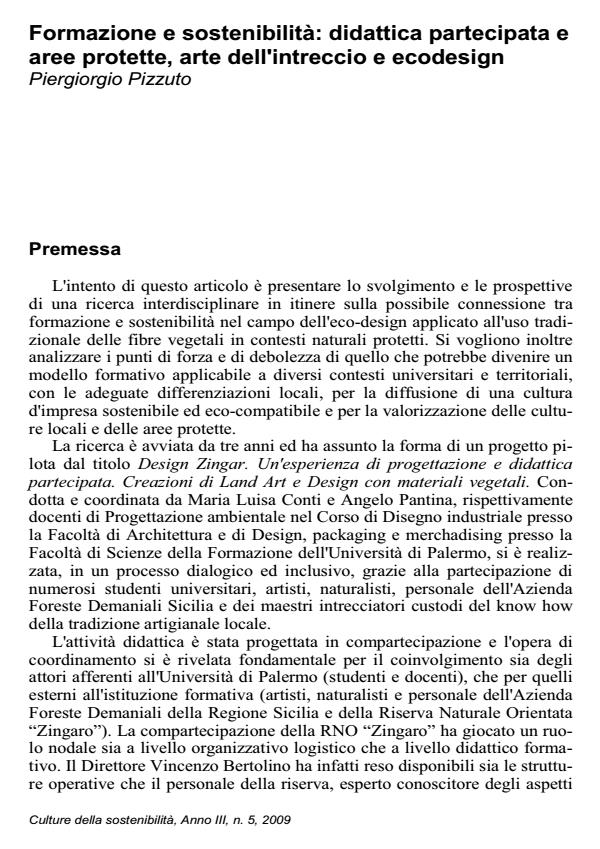Formazione e sostenibilità: didattica partecipata e aree protette, arte dell'intreccio e ecodesign
Journal title CULTURE DELLA SOSTENIBILITA '
Author/s Piergiorgio Pizzuto
Publishing Year 2009 Issue 2009/5
Language Italian Pages 16 P. 160-175 File size 125 KB
DOI 10.3280/CDS2009-005010
DOI is like a bar code for intellectual property: to have more infomation
click here
Below, you can see the article first page
If you want to buy this article in PDF format, you can do it, following the instructions to buy download credits

FrancoAngeli is member of Publishers International Linking Association, Inc (PILA), a not-for-profit association which run the CrossRef service enabling links to and from online scholarly content.
Formazione e sostenibilità: didattica partecipata e aree protette, arte dell'intreccio e ecodesign - The intent of this paper is to present the results and the proceedings of an interdisciplinary research about connections between training and sustainability in the field of eco-design applied in the traditional use of plant fibers. The research has begun three years ago and has taken the form of a pilot project entitled Design Zingaro - a participating experience of planning and training. Creations of Land Art and Design with plant materials. It was realized in an inclusive process of dialogue, trough participation of many university students, artists, naturalists, forest staff and master weaver of traditional know-how of local craft. The educational activity was designed in partnership with all the stakeholders. The action of coordination has revealed vital for the involvement of both participants linked to University and external ones (artists, naturalists, forest staff and master weaver). From the methodological point of view, the process of training and planning has to be analyzed, through an ecological approach to epistemology and by a systemic view. The analysis has to be focused on relationships that enabled the conduct of the process. The main nodal relationships form the basis to build up a reticular and systemic model, able to describe the complexity of our process. There are many thematic issues covered by the research. They are all closely interlinked with each other: 1. the report of the observer with the process under study 2. arrangements and approaches of participing planning and training 3. institutional cooperation 4. the handing down of traditional know how of interlacement with plant fibers 5. fieldwork and residential workshops Abstracts 187 6. design production and artistic outcomes 7. the realization of a quality label for sustainable products 8. public events, promotion and diffusion 9. mass media and international forum.
Piergiorgio Pizzuto, Formazione e sostenibilità: didattica partecipata e aree protette, arte dell'intreccio e ecodesign in "CULTURE DELLA SOSTENIBILITA '" 5/2009, pp 160-175, DOI: 10.3280/CDS2009-005010